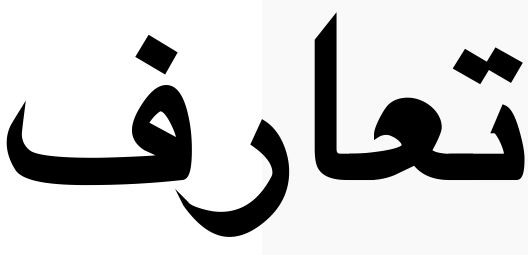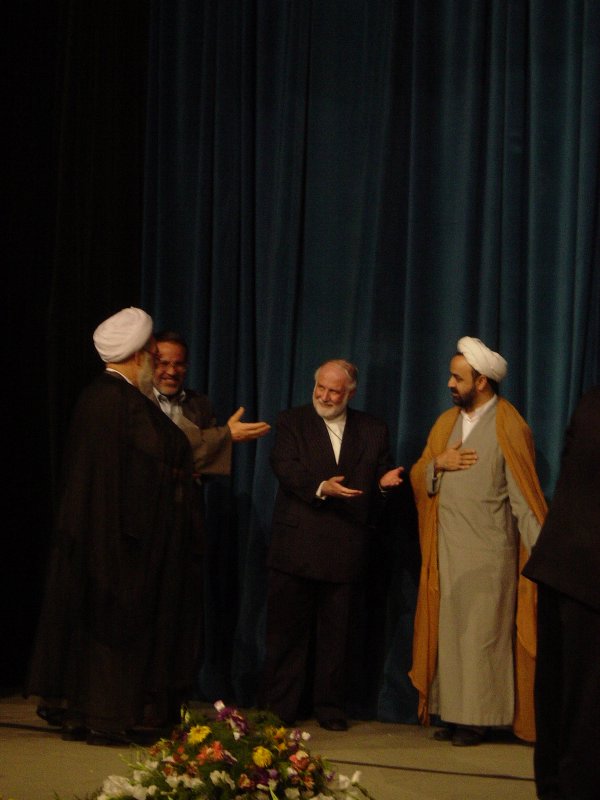
Like the much-rumored Inuit propensity for creating “snow” synonyms, Connecting Dotz‘s line of “In a Word” cards utilizes the nuances imbued in twenty-four foreign nouns and exclamations to convey subtleties within the human condition.
Of the host—”Uffda!” “Istikhara,” “Koi No Yokan,” “Skookum Tumtum”—perhaps my favorite is mamihlapinatapai, above (ma-MI-luh-PEE-na-TAH-pie), from the endangered South American language, Yaghan: “A meaningful look between two people, expressing mutual unstated feelings; literally means ‘ending up mutually at a loss as to what to do about each other.'” Any six cards, $30; twelve, $49.95.

T‘aarof, rendered above in Arabic script, is, according to Wikipedia,
a Persian form of civility emphasizing both self-deference and social rank. The term encompasses a range of social behaviours, from a man displaying etiquette by opening the door for a woman, to a group of colleagues standing on ceremony in front of a door that can permit the entry of only one at time, earnestly imploring the most senior to break the deadlock.
I cite Wikipedia as a source, here—I rarely do this on MEDIA ASSASSIN—because that’s where I discovered this aspect of Middle Eastern culture. (Big up, Wiki: Probably no internet source links more disparate topics than this online medium.)
Reading on,
 The prevalence of t’aarof often gives rise to different styles of negotiation than one would see in a European or North American culture. For example, a worker negotiating a salary might begin with a eulogy of the employer, followed by a lengthy bargaining session consisting entirely of indirect, polite language — both parties are expected to understand the implied topic of discussion. It is quite common for an Iranian worker (even one employed in an Iranian neighborhood within Europe) to work unpaid for a week or two before the issue of wages is finally broached. Likewise, a shopkeeper may initially refuse to quote a price for an item, suggesting that it is worthless (“gh’aabel nadaareh”). T’aarof obliges the customer to insist on paying, possibly several times, before a shopkeeper finally quotes a price and real negotiation can begin.
The prevalence of t’aarof often gives rise to different styles of negotiation than one would see in a European or North American culture. For example, a worker negotiating a salary might begin with a eulogy of the employer, followed by a lengthy bargaining session consisting entirely of indirect, polite language — both parties are expected to understand the implied topic of discussion. It is quite common for an Iranian worker (even one employed in an Iranian neighborhood within Europe) to work unpaid for a week or two before the issue of wages is finally broached. Likewise, a shopkeeper may initially refuse to quote a price for an item, suggesting that it is worthless (“gh’aabel nadaareh”). T’aarof obliges the customer to insist on paying, possibly several times, before a shopkeeper finally quotes a price and real negotiation can begin.
I was stupefied that I’d never heard of this social practice, one whose structure was so elaborate, and whose presence was so intrinsic to Iranian reality, as seen above. I reached out Dr. Michael C. Hillman, a professor of Middle Eastern languages and cultures at the University of Texas at Austin, and author of the book, Iranian Culture: A Persianist View, in order to help me understand this cultural quality. Michael Hillman is a guest, today, on this repeat broadcast of my WBAI-NY / 99.5 FM radio show, NONFICTION, this afternoon, Friday, November 28, at 2 pm ET.
Then, Isaac Dolom, of the late, great, much-lamented Dailysonic podcast—they ceased production in November 2006—takes a trippy look into the microscopic makeup of ordinary sounds. For example, what would a human heartbeat sound like if sped up a thousand times? (Something like a machine, it turns out.) Not to be missed, never to be forgotten.
You can hear their ideas by tuning in at 2 pm. If you’re outside of the New York tri-state, you can check out our stream on the web. If you miss the live show, dig up our archive for up to 90 days after broadcast.


